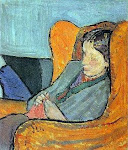
When one of her ill-tempered corgis runs up the steps of a bookmobile parked outside the kitchen entrace to Buckingham Palace, the Queen is obliged to follow it. Once inside, she meets Mr. Hutchings, who runs the mobile library, and Norman Seakins, a browsing kitchen employee. Her Majesty feels that she ought to borrow a book for the sake of decorum, and she chooses a volume by Ivy Compton-Burnett; opening it, she finds that it has not been checked out since 1989. "She's not a popular author, ma'am." "Why, I wonder? I made her a dame."
So begins Alan Bennett's utterly delightful novella The Uncommon Reader, and so begins the Queen's literary adventures. Aided and abetted by the dutiful Norman, who is promoted by the Queen to the role of personal assistant and literary confidante and whose gayness seems not to bother Her Majesty in the slightest (though she shies away from some of his very gay literary recommendations, like Denton Welch or Christopher Isherwood, the latter because she has "no time for all the meditation"), the Queen finds that more and more of her time is occupied by reading. She takes to keeping a book open on her lap during royal carriage rides, waving out the window while really looking at her book; when she leaves an Anita Brookner novel in the carriage while opening Parliament, it is removed by security and exploded lest it be some kind of "device" -- the Queen's response? "That is exactly what it is. A book is a device to ignite the imagination." She tries to interest anyone and everyone in her reading: her husband, the family, the prime minister (who isn't even aware that Iran was once Persia), and Sir Kevin Scatchard, her bitchy New Zealander private secretary. No one is interested, and what's worse, they all seem to regard her reading as unseemly, even improper. Along the way are delicious jokes about nearly every English literary figure from Austen to Woolf. But, more seriously, reading allows the Queen for the first time in her life to escape her own circumstances and to level the playing field -- she has been separated by her role from the common people (the title of the novella an obvious play on the term "common reader," used by, among others, Ben Johnson and Virginia Woolf to indicate the non-academic reader, the reader who reads for his or her own pleasure and entertainment) and now, for the first time, is able to understand, through her encounters with characters, what other people are like. Such is the power of books.
Alan Bennet, author of -- among many other works -- the Tony-winning The History Boys and The Madness of King George, has written a delightfully witty and often vicious literary satire, one which holds up the British public to an astonishing amount of ridicule but which leaves its heroine, Her Majesty herself, virtually unscathed. The book was published in 2007 after first appearing in the London Review of Books, and one would assume that it rode the crest of revitalized popularity of the monarch. Indeed, I kept thinking as I read of Helen Mirren's performance in Stephen Frears's 2006 film The Queen (Mirren also having appeared, incidentally, in the film version of The Madness of King George), and of the human figure presented there. The Uncommon Reader actually makes me want to read a biography of the Queen, though the Queen herself in these pages deems such biographies "tedious in the extreme." Here, the Queen is plucky, funny, sharp, and surprising, particularly in the book's final moments. I don't want to say anything else about the plot, for I don't want to rob anyone of the book's many pleasures. Suffice it to say that Bennett's work is often laugh-out-loud funny, while at the same time offering a subtle examination of what intense reading can do for a person, both positively and negatively. "Reading was not doing," the Queen thinks to herself, "that had always been the trouble. And old though she was, she was still a doer."
But again, the primary delights are the withering one-liners, most of which are enjoyed -- as with most British humor -- in context. Read the book at once, so that you can experience 120 pages of exchanges such as this one: When the Queen mentions at a formal tea to a roomful of past and present advisors that had she asked Macmillan's cabinet how many of them had read Proust, most would've raised their hands, whereas here, no hands are raised. A former foreign secretary pipes in: "I've read Trollope."
"'One is glad to hear it,' said the Queen. 'But Trollope is not Proust.' The home secretary, who had read neither, nodded sagely."


No comments:
Post a Comment